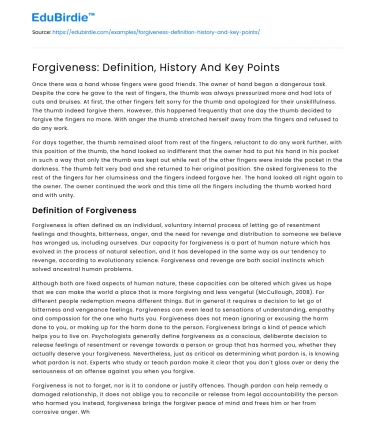Once there was a hand whose fingers were good friends. The owner of hand began a dangerous task. Despite the care he gave to the rest of fingers, the thumb was always pressurized more and had lots of cuts and bruises. At first, the other fingers felt sorry for the thumb and apologized for their unskillfulness. The thumb indeed forgive them. However, this happened frequently that one day the thumb decided to forgive the fingers no more. With anger the thumb stretched herself away from the fingers and refused to do any work.
For days together, the thumb remained aloof from rest of the fingers, reluctant to do any work further, with this position of the thumb, the hand looked so indifferent that the owner had to put his hand in his pocket in such a way that only the thumb was kept out while rest of the other fingers were inside the pocket in the darkness. The thumb felt very bad and she returned to her original position. She asked forgiveness to the rest of the fingers for her clumsiness and the fingers indeed forgave her. The hand looked all right again to the owner. The owner continued the work and this time all the fingers including the thumb worked hard and with unity.
Save your time!
We can take care of your essay
- Proper editing and formatting
- Free revision, title page, and bibliography
- Flexible prices and money-back guarantee
Definition of Forgiveness
Forgiveness is often defined as an individual, voluntary internal process of letting go of resentment feelings and thoughts, bitterness, anger, and the need for revenge and distribution to someone we believe has wronged us, including ourselves. Our capacity for forgiveness is a part of human nature which has evolved in the process of natural selection, and it has developed in the same way as our tendency to revenge, according to evolutionary science. Forgiveness and revenge are both social instincts which solved ancestral human problems.
Although both are fixed aspects of human nature, these capacities can be altered which gives us hope that we can make the world a place that is more forgiving and less vengeful (McCullough, 2008). For different people redemption means different things. But in general it requires a decision to let go of bitterness and vengeance feelings. Forgiveness can even lead to sensations of understanding, empathy and compassion for the one who hurts you. Forgiveness does not mean ignoring or excusing the harm done to you, or making up for the harm done to the person. Forgiveness brings a kind of peace which helps you to live on. Psychologists generally define forgiveness as a conscious, deliberate decision to release feelings of resentment or revenge towards a person or group that has harmed you, whether they actually deserve your forgiveness. Nevertheless, just as critical as determining what pardon is, is knowing what pardon is not. Experts who study or teach pardon make it clear that you don't gloss over or deny the seriousness of an offense against you when you forgive.
Forgiveness is not to forget, nor is it to condone or justify offences. Though pardon can help remedy a damaged relationship, it does not oblige you to reconcile or release from legal accountability the person who harmed you instead, forgiveness brings the forgiver peace of mind and frees him or her from corrosive anger. While there is some controversy about whether true forgiveness includes positive feelings for the perpetrator, experts agree that it needs at least letting go of the strongly held negative feelings. It empowers you to recognize the pain and allows you to heal and move on with your life. Although early research focused on individuals forgiving others, new research areas are beginning to explore the benefits of collective forgiveness and self-forgiveness.
History of Forgiveness
Definitions of forgiveness rely on historical cultural factors that have been influenced by theological, philosophical, and theoretical views. The idea of redemption itself dates back millennia. Major world religions have long fostered redemption, with religious adherents extolling the practice’s many benefits (Ryeet al., 2000). Forgiveness has also a history in philosophy, with Nietzsche (1887) arguing for the inherent difference in power between offender and offender. Yet, in the field of psychology, forgiveness received little attention until the 1980s (see McCullough, Pargament & Thoresen, 2000, for a historical overview). Indeed, numerous systems were proposed for the relationship of forgiveness to health. These include forgiveness as an emotional strategy for coping, as improving the functioning of the immune system, as activating motivational systems (Worthington & Scherer, 2004), As decreasing sympathetic function of the nervous system (Berry & Worthington, 2001) as promoting increased social interaction (Toussaint & Webb, 2005), as increasing personal control feelings (McCullough & Worthington, 1994).
Key Points about Forgiveness
Forgiveness is not a simple act in response to an individual incident, but a lengthy, ever-changing process in which people work to repair broken relationships or broken hearts. Recognition: Forgiveness is about recognizing that we are all fallible human beings willing to mess up. Empathy: Forgiveness requires a degree of empathy or compassion rather than just acknowledging or letting go. Reconciliation: Forgiveness is distinct from reconciliation involving some sort of peace process and uniting two or more former opposing sides.






 Stuck on your essay?
Stuck on your essay?

